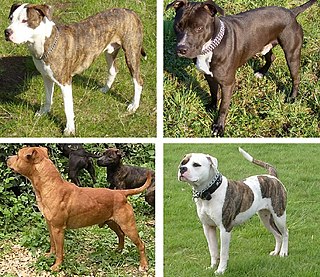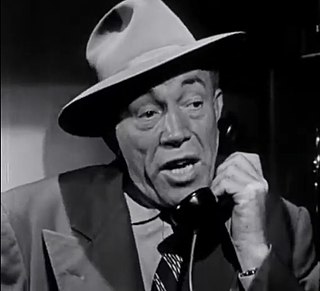
Pit bull is a term used in the United States for a type of dog descended from bulldogs and terriers, while in other countries such as the United Kingdom the term is used as an abbreviation of the American Pit Bull Terrier breed. Within the United States the pit bull is usually considered a diverse grouping that includes the breeds American Pit Bull Terrier, American Staffordshire Terrier, American Bully, Staffordshire Bull Terrier and occasionally the American Bulldog, along with any crossbred dog that shares certain physical characteristics with these breeds. In other countries including Britain, the Staffordshire Bull Terrier is not considered a pit bull. Most pit bull-type dogs descend from the British Bull and terrier, a 19th-century dog-fighting type developed from crosses between the Old English Bulldog and the Old English Terrier.
The New Deal coalition was an American political coalition that supported the Democratic Party beginning in 1932. The coalition is named after President Franklin D. Roosevelt's New Deal programs, and the follow-up Democratic presidents. It was composed of voting blocs who supported them. The coalition included labor unions, blue-collar workers, racial and religious minorities, rural white Southerners, and intellectuals. Besides voters the coalition included powerful interest groups: Democratic party organizations in most states, city machines, labor unions, some third parties, universities, and foundations. It was largely opposed by the Republican Party, the business community, and rich Protestants. In creating his coalition, Roosevelt was at first eager to include liberal Republicans and some radical third parties, even if it meant downplaying the "Democratic" name. By the 1940s, the Republican and third-party allies had mostly been defeated. In 1948, the Democratic Party stood alone and survived the splits that created two splinter parties.

Bull-baiting is a blood sport involving putting a bull against dogs with the aim of attacking and subduing the bull by biting and holding onto its nose or neck, which often resulted in the death of the bull.

The Australian Council of Trade Unions (ACTU), originally the Australasian Council of Trade Unions, is the largest peak body representing workers in Australia. It is a national trade union centre of 46 affiliated unions and eight trades and labour councils. The ACTU is a member of the International Trade Union Confederation.

The nature and power of organized labor in the United States is the outcome of historical tensions among counter-acting forces involving workplace rights, wages, working hours, political expression, labor laws, and other working conditions. Organized unions and their umbrella labor federations such as the AFL–CIO and citywide federations have competed, evolved, merged, and split against a backdrop of changing values and priorities, and periodic federal government intervention.

A stevedore, also called a longshoreman, a docker or a dockworker, is a waterfront manual laborer who is involved in loading and unloading ships, trucks, trains or airplanes.

Breed-specific legislation (BSL) is a type of law that prohibits or restricts particular breeds or types of dog. Such laws range from outright bans on the possession of these dogs, to restrictions and conditions on ownership, and often establishes a legal presumption that such dogs are dangerous or vicious to prevent dog attacks. Some jurisdictions have enacted breed-specific legislation in response to a number of fatalities or maulings involving pit bull–type dogs or other dog breeds commonly used in dog fighting, and some government organizations such as the United States Army and Marine Corps have taken administrative action as well. Due to opposition to such laws, anti-BSL laws have been passed in 21 of the 50 state-level governments in the United States, prohibiting or restricting the ability of jurisdictions within those states to enact or enforce breed-specific legislation.

The Transport Workers Act 1928 (Cth), more widely known as the Dog Collar Act, was a law passed by the Australian Parliament. It achieved royal assent on 24 September 1928, after being instigated and introduced to Parliament by the Bruce government. It was ostensibly "relating to employment in relation to trade and commerce with other countries and among the states", which mirrors the wording of Section 51(i) of the Constitution of Australia.
The Australian labour movement began in the early 19th century and since the late 19th century has included industrial and political wings. Trade unions in Australia may be organised on the basis of craft unionism, general unionism, or industrial unionism. Almost all unions in Australia are affiliated with the Australian Council of Trade Unions (ACTU), many of which have undergone a significant process of amalgamations, especially in the late 1980s and early 1990s. The leadership and membership of unions hold and have at other times held a wide range of political views, including communist, socialist and right-wing views.

The 1934 West Coast Waterfront Strike lasted 83 days, and began on May 9, 1934 when longshoremen in every US West Coast port walked out. Organized by the International Longshore and Warehouse Union (ILWU), the strike peaked with the death of two workers on "Bloody Thursday" and the San Francisco General Strike which stopped all work in the major port city for four days and led ultimately to the settlement of the West Coast Longshoremen's Strike.

The International Longshoremen's Association (ILA) is a North American labor union representing longshore workers along the East Coast of the United States and Canada, the Gulf Coast, the Great Lakes, Puerto Rico, and inland waterways. The ILA has approximately 200 local affiliates in port cities in these areas.

The Maritime Union of Australia (MUA) was a union which covered waterside workers, seafarers, port workers, professional divers, and office workers associated with Australian ports. The MUA was formed in 1993 with merger of the Seamen's Union of Australia and the Waterside Workers' Federation of Australia.

The Federated Ship Painters and Dockers Union (FSPDU) was an Australian trade union which existed between 1900 and 1993. It represented labourers in the shipbuilding industry, covering "mostly work associated with chipping, painting, scrubbing [and] cleaning [ships], working in every size of tanks, cleaning boilers, docking and undocking vessels, and rigging work".
Dockworkers in the United States city of New Orleans at the turn of the 20th century often coordinated their unionization efforts across racial lines. The nature of that coordination has led some scholars to conclude that the seeming interracial union activity was in fact biracial: a well-organized plan of parallel concerted activity with coordination and support between the groups, but with a clear divide along racial lines. Under this framework, cooperation was seen less a matter of ideological interracial solidarity among the working class and more a matter of pragmatism so that the working conditions of each distinct group would improve.
A bullpen or bull pen may refer to:

Billy Nelson was an American vaudeville comedian and actor who appeared in over 80 films and television programs. He was featured several times on one of the iconic black and white TV series of the 1950s Adventures of Superman; his appearances are still seen on television today.

The working class comprises those engaged in manual-labour occupations or industrial work, who are remunerated via waged or salaried contracts. Working-class occupations include blue-collar jobs, and most pink-collar jobs. Members of the working class rely exclusively upon earnings from wage labour; thus, according to more inclusive definitions, the category can include almost all of the working population of industrialized economies, as well as those employed in the urban areas of non-industrialized economies or in the rural workforce.

The International Longshore and Warehouse Union (ILWU) is a labor union which primarily represents dock workers on the West Coast of the United States, Hawaii, and in British Columbia, Canada. The union was established in 1937 after the 1934 West Coast Waterfront Strike, a three-month-long strike that culminated in a four-day general strike in San Francisco, California, and the Bay Area. It disaffiliated from the AFL–CIO on August 30, 2013.

The Waterside Workers' Federation of Australia (WWF) was an Australian trade union that existed from 1902 to 1993. After a period of negotiations between other Australian maritime unions, it was federated in 1902 and first federally registered in 1907; its first general president was Billy Hughes.
The Dalfram dispute of 1938 was a political industrial dispute at Port Kembla, New South Wales, protesting the export of pig iron from Australia to Japan during the Second Sino-Japanese War. It became famous for providing the nickname of Pig Iron Bob to Attorney General Robert Menzies, later to serve as Prime Minister.














